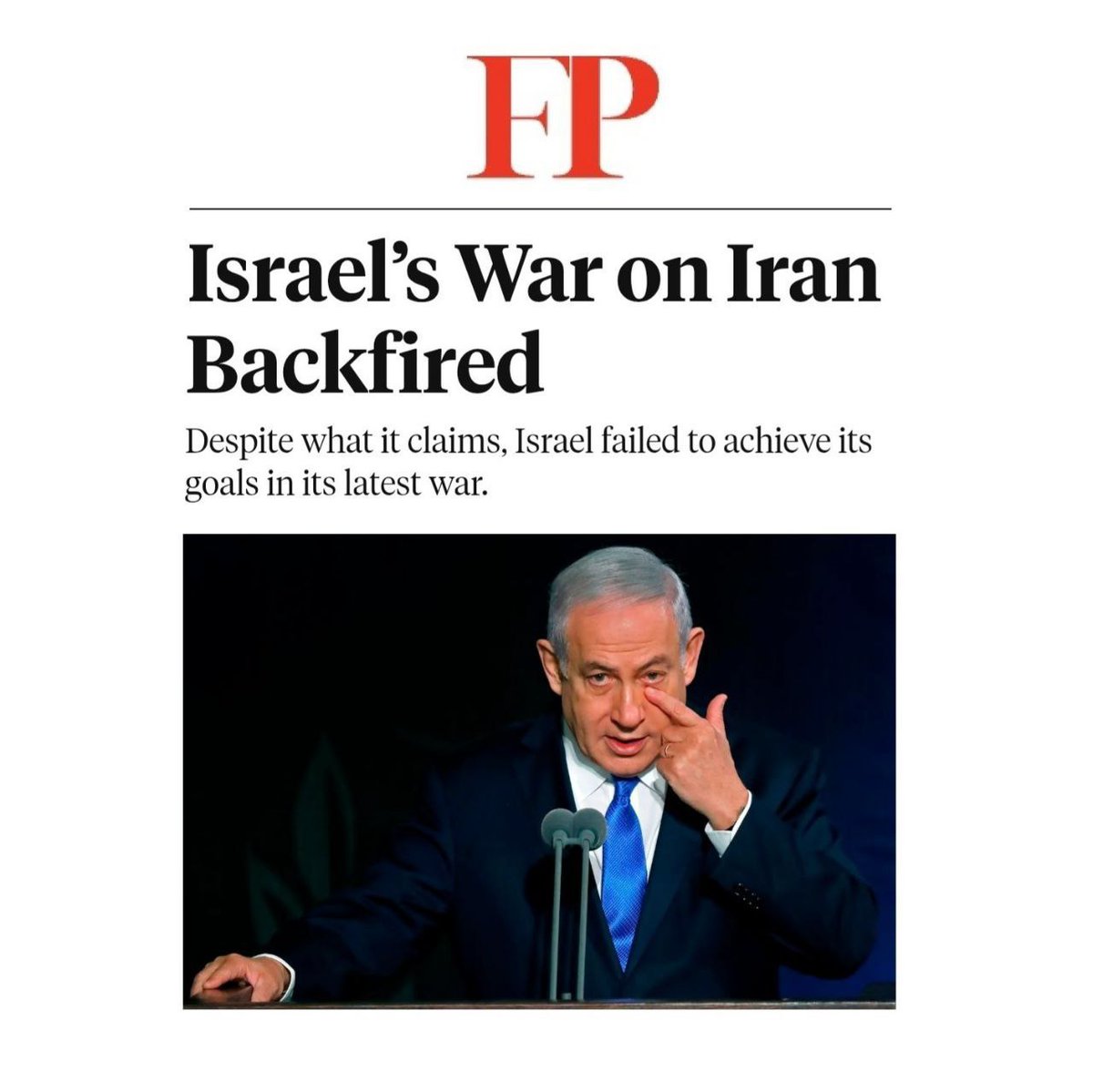[GUEST ACCESS MODE: Data is scrambled or limited to provide examples. Make requests using your API key to unlock full data. Check https://lunarcrush.ai/auth for authentication information.]  Iran Military Monitor [@IRIran_Military](/creator/twitter/IRIran_Military) on x 1.7M followers Created: 2025-07-02 16:20:01 UTC The American specialized magazine Foreign Policy, citing the outcomes of the 12-day war, described the attack on Iran as Netanyahu’s big gamble that failed: 🔹Despite its claims about the war, Israel failed to achieve its objectives. The 12-day war completely discredited the long-held belief that the Iranian government only needed one final push from abroad to collapse. Netanyahu launched this war with the goal of eliminating Iran’s strategic threat and challenge to Israel. Instead, it exposed Israel’s own vulnerabilities, strengthened Iranian nationalism, and failed to destroy Iran’s fundamental military and nuclear capabilities. 🔹The twelve days of war left heavy devastation on both sides. However, the clearest outcome of this recent conflict is that Netanyahu’s big gamble ended in failure. Despite his promises to dismantle Iran’s missile and nuclear programs and his hopes for regime change, Iran responded swiftly by firing missiles at Israeli cities and strategic targets. 🔹Even after the U.S. joined the conflict, Iran sent a message by attacking Al-Udeid Air Base, demonstrating its ability to extend the threat beyond its borders. As a result, this war may paradoxically end up strengthening Iran’s regional and diplomatic position. 🔹Iran’s attacks appeared precise and well-planned. After Israel struck Iran’s South Pars oil refinery, Iran retaliated by targeting the Haifa refinery. Following Israeli attacks on research centers, Iran struck back by hitting the Weizmann Institute, long suspected of involvement in Israel’s nuclear research. Iran’s goal in these calculated retaliations was to showcase its capability for measured responses and reinforce its deterrent posture. Shortly after, attacks on energy infrastructure ceased. 🔹Israel, by targeting residential areas, media outlets, prisons, and police stations, revealed a broader strategy aimed at sowing chaos and fueling internal unrest. With children, doctors, and civilians killed in indiscriminate Israeli strikes, the perception inside Iran grew that this war was not about "liberating" Iranians but about breaking the country apart. 🔹The war had significant socio-political repercussions in Iran. Instead of collapsing the regime, the conflict became a unifying moment, significantly boosting nationalist sentiments. People rallied around the idea of defending the country against foreign aggression, with even many Gen Z members mobilizing in support. Full text:  XXXXXXX engagements  **Related Topics** [netanyahu](/topic/netanyahu) [israel](/topic/israel) [specialized](/topic/specialized) [iran](/topic/iran) [Post Link](https://x.com/IRIran_Military/status/1940445363678454029)
[GUEST ACCESS MODE: Data is scrambled or limited to provide examples. Make requests using your API key to unlock full data. Check https://lunarcrush.ai/auth for authentication information.]
 Iran Military Monitor @IRIran_Military on x 1.7M followers
Created: 2025-07-02 16:20:01 UTC
Iran Military Monitor @IRIran_Military on x 1.7M followers
Created: 2025-07-02 16:20:01 UTC
The American specialized magazine Foreign Policy, citing the outcomes of the 12-day war, described the attack on Iran as Netanyahu’s big gamble that failed:
🔹Despite its claims about the war, Israel failed to achieve its objectives. The 12-day war completely discredited the long-held belief that the Iranian government only needed one final push from abroad to collapse. Netanyahu launched this war with the goal of eliminating Iran’s strategic threat and challenge to Israel. Instead, it exposed Israel’s own vulnerabilities, strengthened Iranian nationalism, and failed to destroy Iran’s fundamental military and nuclear capabilities.
🔹The twelve days of war left heavy devastation on both sides. However, the clearest outcome of this recent conflict is that Netanyahu’s big gamble ended in failure. Despite his promises to dismantle Iran’s missile and nuclear programs and his hopes for regime change, Iran responded swiftly by firing missiles at Israeli cities and strategic targets.
🔹Even after the U.S. joined the conflict, Iran sent a message by attacking Al-Udeid Air Base, demonstrating its ability to extend the threat beyond its borders. As a result, this war may paradoxically end up strengthening Iran’s regional and diplomatic position.
🔹Iran’s attacks appeared precise and well-planned. After Israel struck Iran’s South Pars oil refinery, Iran retaliated by targeting the Haifa refinery. Following Israeli attacks on research centers, Iran struck back by hitting the Weizmann Institute, long suspected of involvement in Israel’s nuclear research. Iran’s goal in these calculated retaliations was to showcase its capability for measured responses and reinforce its deterrent posture. Shortly after, attacks on energy infrastructure ceased.
🔹Israel, by targeting residential areas, media outlets, prisons, and police stations, revealed a broader strategy aimed at sowing chaos and fueling internal unrest. With children, doctors, and civilians killed in indiscriminate Israeli strikes, the perception inside Iran grew that this war was not about "liberating" Iranians but about breaking the country apart.
🔹The war had significant socio-political repercussions in Iran. Instead of collapsing the regime, the conflict became a unifying moment, significantly boosting nationalist sentiments. People rallied around the idea of defending the country against foreign aggression, with even many Gen Z members mobilizing in support.
Full text:

XXXXXXX engagements
Related Topics netanyahu israel specialized iran